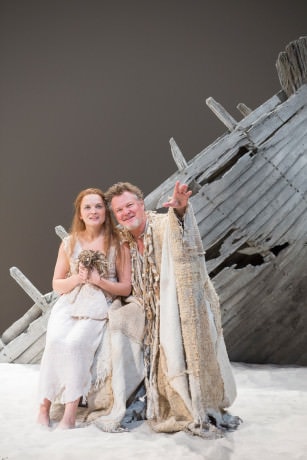In Part Three of a series of interviews with the cast of Shakespeare Theatre Company’s The Tempest, meet Rachel Mewbron.
Michael: Introduce yourself to our readers, and tell them where they may have seen you on local stages in the past year.
Rachel: My name is Rachel Mewbron, and The Tempest is my first DC production, though I hope not my last. We’ve had such great audiences during our run. It makes it a real pleasure to do the work.

Can you tell us a little about The Tempest and what it was about it that made you want to be part of this production?
The Tempest is Shakespeare’s final play, a Romance, so it has a little of everything: Clowns, Lovers, courtly intrigue… I really love working on Shakespeare, it never lets you down. There is such a breadth to the language, and that size allows the actor to be bold. Why did I want to be a part of this production? I was offered a wonderful role at one of the best theatres in the country helmed by a director I respect. I couldn’t say no.
Who do you play and how can you relate to your character? Which character is most like you and why?
I play Miranda, Prospero’s daughter, one of the play’s lovers. How can I relate to her? Well, I’m a daughter and I was recently married… I played Miranda a few years ago, and at the time I thought I had all the life info necessary to play the young girl in love, but Miranda isn’t just a young girl in love. (SPOILER AHEAD) She’s a young girl who starts the play with no one but her father, she meets a man, she falls in love, she asks him to marry her, he says yes, her father gives her away and by the end she’s leaving her home forever!It’s a huge journey. There’s a loss in marriage (obviously also a huge gain)… I didn’t know about it before. I also love the possibilities of a character who grew up on an uninhabited magical island: a wild girl whose father taught her all about rules of court and history and peerage, etc. So she can be proper or tomboyish in almost the same breath.

Have you played this role before, and if so, how is the role being performed and directed the same or differently?
I have played the role before. I did The Tempest at the Shakespeare Theatre of New Jersey a few years ago. There are three major similarities between the two productions: 1) The are both productions of The Tempest. 2) They are set in Elizabethan times. 3) I am playing Miranda. It would seem that 1 and 2 would make the productions very similar so that I could just do exactly the same thing I did before. But every person brings something new to the table. It’s why Shakespeare companies can even exist. You can see Hamlet or Romeo and Juliet or The Tempest a thousand times, and still learn something new from that thousandth performance. The same can be said for performing in them: The artists around you and the text on the page give you fresh eyes every night.
The Tempest is known for its supernatural elements. What is your favorite moment of “magic” in this production?
UGH! I can’t pick just one!! The Harpy? No! The Goddesses? No! The Gaberdine? I think the clowns (Stephano, Trinculo and Caliban) are magic. They take jokes that are five hundred years old with no contemporary context and make them funny every night. I still watch their first scene on the monitor downstairs and laugh. That’s magic.
In the context of your personal career, does The Tempest fit into a pattern? Or does it represent a break in the kind of work you normally do?
It hasn’t been so very long since I graduated from drama school. I don’t think I can claim a personal career quite yet. Certainly not one with patterns J It is the first Shakespeare I’ve done since graduating.
Tell us a bit about your relationship with Shakespeare; do you approach it differently than contemporary drama? What are the unique qualities that Shakespeare can bring to the stage?
Shakespeare demands rigor. I think acting demands rigor regardless, but you can get away with a less rigorous approach to a contemporary script. Not that it does anyone any good to skimp on script analysis, but the audience is going to understand the words coming out of your mouth (compelling or not) if you’re working on something contemporary. Shakespeare wrote in verse primarily, and when he’s writing in prose the colloquialisms are five hundred years old. It’s my job to not only know the meaning of what I’m saying, but also to understand the rhythm of the verse, which images to lift up so that the audience really hears them. When humans listen to a story we tend to hear about 40% of the words that are spoken. If I give a lift to all the pronouns and adjectives or hit a conjunction unnecessarily then I’m not helping to ensure that the 40% the audience hears will help them put the story together.
Tell us a bit about the rehearsal process; was there more of an emphasis on the text than with a non-Classical show?
Hmmm. Not really in this rehearsal process. We spent about a week at the table, talking through the play, making sure we were all on the same page. That’s a pretty standard amount of time to do table work, regardless of the play. Ethan assembled a solid group of actors, confident in their Shakespeare, who did their text work at home. I had an inkling that the story would be well told from the very first read through.
What is your favorite scene that you are not on stage for?
The Gaberdine scene. The first scene with the clowns. I love to laugh.
In your opinion, what makes this staging of The Tempest different than past productions?
Everything is different. Even if you’ve seen The Tempest before, you’ve never seen this production. Plus, if you’ve only seen it once before, you only heard about 40% of it ;) Seriously though, The Tempest by itself, just as a script, has something for every stage of your life. Some of the most moving meditations on life, age, forgiveness, vengeance, love, nature… you name it, it’s in this play in poetical spades.
How can today’s audiences relate to The Tempest?
There is a lot to enjoy in this production of The Tempest. If you find something personal in the words and thoughts, or if it makes you think of something in the context of your life or the world, even better.
The Tempest plays through January 18, 2015, at Shakespeare Theatre Company’s Sidney Harman Hall – 610 F Street, NW, in Washington, DC. For tickets, call the box office at (202) 547-1122, or purchase them online.
LINKS
Review of ‘The Tempest’ at Shakespeare Theatre Company by Sophia Howes.
Meet the Cast of Shakespeare Theatre Company’s The Tempest: Part 1: Sofia Jean Gomez.
Meet the Cast of Shakespeare Theatre Company’s The Tempest: Part 2: Clifton Duncan.
Meet the Cast of Shakespeare Theatre Company’s The Tempest: Part 3: Rachel Mewbron.





